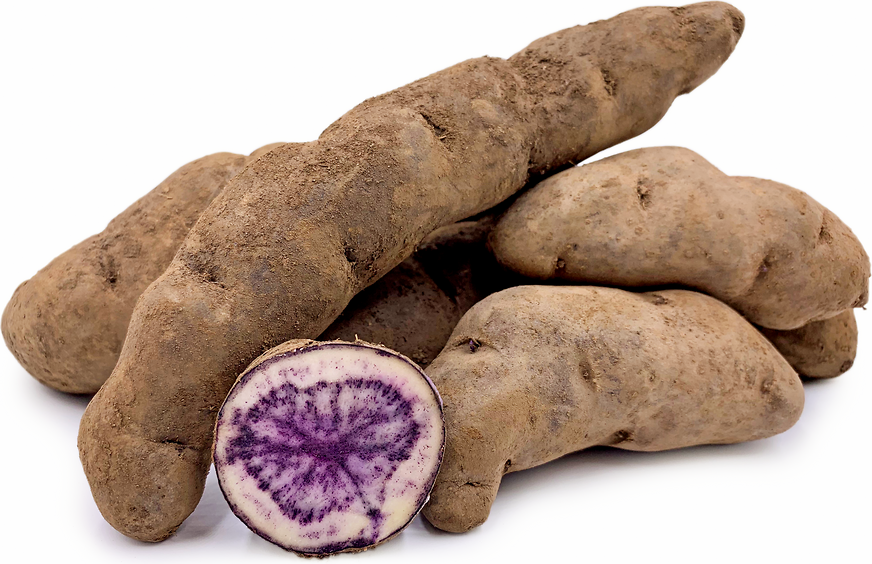


Morada Potatoes
Estimated Inventory, lb : 0
Description/Taste
Morada potatoes are generally small in size and are knobby, oblong, and slender in shape with curved or straight ends. The semi-rough skin is tan to brown and is covered in medium-set eyes, creating a bumpy exterior. Underneath the thin skin, the dense flesh is firm, dry, and cream-colored with a vivid marbling of purple and violet hues. Morada potatoes are starchy, and when cooked, they develop a soft, somewhat mealy texture with a nutty, earthy flavor.
Seasons/Availability
Morada potatoes are available year-round.
Current Facts
Morada potatoes, botanically classified as Solanum tuberosum, are edible, underground tubers that are members of the Solanaceae or nightshade family along with eggplant and tomatoes. Native to Peru, Morada in Spanish means “purple” and the name “purple potatoes” is used to describe many different varieties of indigenous Peruvian tubers that contain purple hues. In Peru, purple potato varieties widely range from having a solid, dark blue-purple flesh and skin tone, to lighter colored skin with marbled flesh, to a combination of the two as many native varieties have been hybridized and blended in cultivation over hundreds of years. Morada potatoes are favored for their unique coloring and nutty flavor, commonly used as a table potato in everyday cooking in Peru.
Nutritional Value
Morada potatoes are an excellent source of potassium, vitamin C, fiber, and antioxidants. They also contain some magnesium, phosphorus, calcium, iron, and zinc.
Applications
Morada potatoes are utilized in a wide variety of culinary applications and can be roasted, fried, boiled, and baked. The tuber’s semi-starchy texture allows them to hold their shape when boiled and can be cubed and tossed into potato salads, cooked in soups or stews, or boiled and mashed as a colorful side dish. They can also be made into gnocchi or baked and served whole. Morada potatoes will retain some color when cooked, but depending on the tonality of the marbling, each tuber will vary. The thin skin is also edible, containing many nutrients, and can be left on in the cooking process. In Peru, Morada potatoes are incorporated into causa morada, which is a layered dish made out of boiled, mashed potatoes and a filling such as chicken or tuna salad. This dish can be served as an accompaniment to main dishes or served as an appetizer. Morada potatoes are also commonly stuffed with fillings, sliced into French fries, or boiled, sliced, and topped with sauces. Morada potatoes pair well with poultry, beef, pork, fish, beans, corn, cilantro, garlic, rice, and quinoa. The tubers will keep 3-5 weeks when stored in a cool, dry, and day place.
Ethnic/Cultural Info
In Peru, potatoes are considered to be one of the most important crops as a source of revenue, and many of the tubers are grown by small family farms. Potatoes are also deeply rooted in Peruvian culture and tradition, but with globalization expanding many lower-cost foods to the country, many of the native varieties are being lost in cultivation. To protect and promote the unique tubers, Peru has created the National Potato Day, which is celebrated annually on May 30th. During the celebration, many of the native varieties such as the Morada are highlighted to bring awareness to the nutritious tubers and to spark a sense of pride over the historical significance of cultivating potatoes. National Potato Day is celebrated throughout the country and restaurants also highlight the native potatoes by creating popular traditional Peruvian dishes such as pachamanca, lomo saltado, papas a la huanciana, and causa.
Geography/History
Morada potatoes are native to Peru and potatoes, in general, have been cultivated in regions across the country for over eight thousand years. Since ancient times, many of these native tubers were cross-bred to create new and improved varieties, leading Peru to have over three-thousand different kinds of potatoes today. Morada potatoes can be found in select regions of Peru, cultivated on a small scale and sold at fresh local markets.




